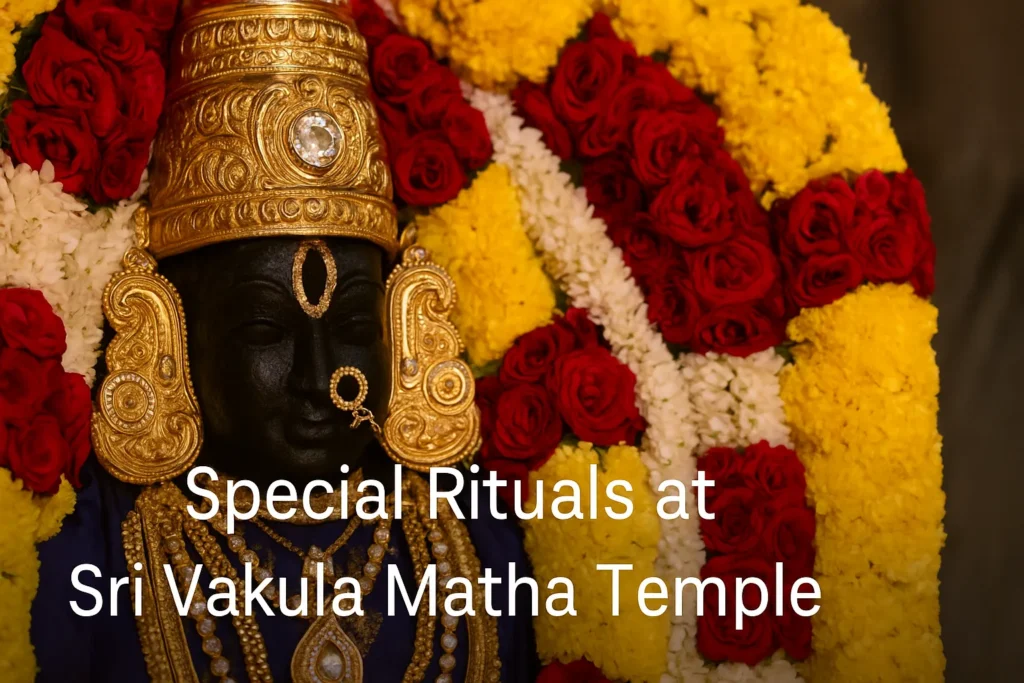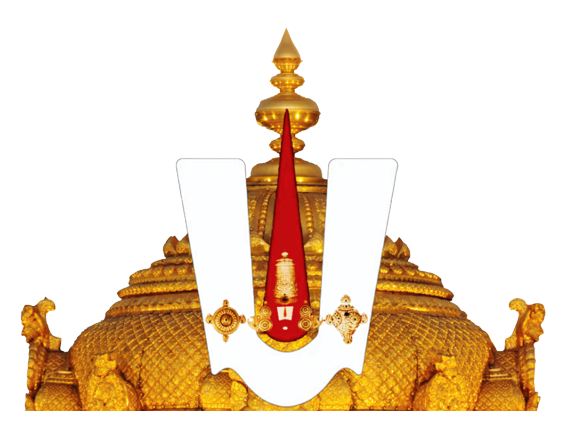Discover the unique rituals and special offerings at Sri Vakula Matha Temple in Peruru, Tirupati. Explore the temple’s sacred ceremonies honoring Lord Venkateswara’s divine mother, from traditional Naivedyam practices to special Abhishekams. This comprehensive guide covers daily worship schedules, festival celebrations, and devotional offerings that create a profound spiritual connection at this recently renovated hilltop shrine. Learn how these ancient rituals celebrate the divine mother-son relationship central to Hindu mythology.
Nestled atop the picturesque Peruru Banda hillock near Tirupati in Andhra Pradesh, Sri Vakula Matha Temple stands as a testament to divine maternal love. This sacred shrine, dedicated to the foster mother of Lord Venkateswara, embodies a unique spiritual significance that draws devotees from across the country. Recently renovated and reopened to the public in June 2022, the temple has regained its former glory and now serves as an important pilgrimage destination. The special rituals and offerings performed here not only honor the divine mother-son relationship but also provide devotees with a profound spiritual experience.

In this comprehensive guide, we’ll explore the distinctive rituals, offerings, and ceremonies that make Sri Vakula Matha Temple a must-visit destination for those seeking divine blessings and spiritual fulfillment.
Table of Contents
Historical Background and Significance
Before delving into the rituals, it’s essential to understand the temple’s historical and mythological significance, which forms the foundation for its unique ceremonial practices.
The Divine Mother-Son Connection
According to Hindu mythology, Vakula Devi is the reincarnation of Yashoda, Lord Krishna’s foster mother during the Dwapara Yuga. Legend has it that Yashoda expressed her disappointment to Lord Krishna about not witnessing any of his marriages. Compassionate toward her maternal feelings, Krishna promised that in his next incarnation in the Kali Yuga as Lord Venkateswara (also known as Srinivasa), she would be reborn as his foster mother and would have the privilege of arranging his marriage.
True to this divine promise, Yashoda was reborn as Vakula Devi, who nurtured Lord Venkateswara and eventually arranged his marriage with Goddess Padmavathi, the daughter of King Akasha Raju. This fulfillment of the divine promise forms the core of the temple’s spiritual narrative and influences many of its rituals.
Temple Architecture and Layout
The Sri Vakula Matha Temple spans an impressive 83.42 acres and features a magnificent gopuram (temple tower) plated with 20 kg of gold. The temple’s orientation is particularly significant – it was constructed so that the deity faces the Seven Hills of Tirumala, where her divine son Lord Venkateswara resides. This architectural feature symbolizes the eternal maternal gaze of Vakula Devi watching over her son.
After lying in a dilapidated condition for years, the temple underwent extensive renovations starting in 2011 and was finally reopened to the public in June 2022. The renovations, carried out according to the traditional Agama Shastra guidelines, have restored the temple to its former glory while preserving its spiritual essence.
Daily Rituals at Sri Vakula Matha Temple
The daily worship schedule at Sri Vakula Matha Temple follows a structured routine that devotees can participate in for spiritual benefits. These rituals are conducted with precision and devotion by trained priests who maintain the sacred traditions.
Morning Ritual Schedule
The temple’s day begins with the Suprabhatam at 5:30 AM, a ritual that awakens the deity with sacred hymns and prayers. This early morning ritual sets a serene tone for the day’s spiritual activities and is attended by devout early risers who seek the blessings of Vakula Matha at daybreak.
Following the Suprabhatam, from 6:00 AM to 6:45 AM, priests perform the Nivedana ritual, which involves offering food to the deity. This morning offering is considered particularly auspicious and symbolizes the nourishment that Vakula Devi would provide to young Lord Venkateswara.
From 6:45 AM to 11:30 AM, the temple opens for Sarva Darsanam, allowing general devotees to have a glimpse of the deity and offer their prayers. The morning session concludes with Archana and Nivedana rituals from 11:30 AM to 12:00 noon, after which the temple closes for the afternoon.
Evening Ritual Schedule
The temple reopens at 4:30 PM for the evening Sarva Darsanam, which continues until 6:00 PM. This is followed by the evening Nivedana from 6:00 PM to 6:30 PM. The temple remains open for devotees from 6:30 PM to 8:30 PM, concluding with the Ekanta Seva, a private service dedicated to the deity.
According to temple records, the evening hours often see more visitors than the morning sessions, as many pilgrims prefer the breathtaking sunset view from the hilltop temple, which adds to the spiritual experience. As noted by the GoTirupati tourism guide, “The majority of the Pilgrims are visiting this temple in the evening hours and the scenic view is too good from the hilltop.”
Special Weekly Rituals
Beyond the daily worship schedule, Sri Vakula Matha Temple observes special rituals on specific days of the week, with Friday holding particular significance.
Friday Special Rituals
Friday is considered especially sacred at the Sri Vakula Matha Temple, with distinctive ceremonies that attract larger crowds. On this auspicious day, a special Abhishekam (ritual bathing of the deity) is performed with reverence. This ceremony involves bathing the deity with various sacred substances like milk, yogurt, honey, ghee, sandalwood paste, and rosewater.
The Friday rituals at the temple reflect the connection between Vakula Devi and Goddess Lakshmi (worshipped on Fridays in Hindu tradition), emphasizing the feminine divine principle. Devotees believe that participating in Friday prayers at the temple brings prosperity and removes obstacles from their path.
The Unique Naivedyam Tradition
Perhaps the most distinctive ritual associated with Sri Vakula Matha Temple is the Naivedyam offering tradition, which exemplifies the divine mother-son relationship between Vakula Devi and Lord Venkateswara.
The Mother’s Preference
According to ancient temple traditions, the Naivedyam (food offering) is first presented to Vakula Devi at this temple before it is offered to Lord Venkateswara at Tirumala. This sequence honors the maternal position of Vakula Devi and reinforces the cultural value of respecting one’s mother.
When the Naivedyam is prepared and ready to be offered, priests at Sri Vakula Matha Temple ring large ceremonial bells to signal that the offerings are being presented to the divine mother. As described by Tirumala Tirupati Yatra, “The Priests ring the large bells at Vakula maata temple to indicate naivedyam offered to the mother, later Priests at Tirumala submit offerings to Lord Venkateswara.” Only after this ceremony is completed do the priests at Tirumala present offerings to Lord Venkateswara.
This tradition beautifully captures the essence of Indian family values, where a mother is honored first, and her blessing is sought before approaching the main deity. Though this practice was temporarily discontinued when the temple fell into disrepair, it has been revived after the recent renovations.
Special Food Offerings
The temple has specific prasadam (consecrated food) offerings that hold special significance:
- Traditional Millet Offerings: Drawing from historical accounts of how Vakula Devi nourished Lord Venkateswara on Tirumala hills, the temple offers dishes prepared from Shyamaka (millet grain), which was abundantly available on the hills. According to Tirumala Tirupati Yatra, Vakula Matha “began to feed Lord Srinivasa” with food prepared from this grain, “To add taste to the food she used to mix honey to it.” These offerings are often sweetened with honey, reflecting the preferences attributed to Lord Venkateswara.
- Dairy Specialties: Fresh milk, butter, and curd rice served in a traditional clay vessel are among the special offerings, recalling the childhood favorites of Lord Krishna that continue to please him in his incarnation as Lord Venkateswara. The same source notes that “Daily during Suprabhata Seva Lord Srinivasa takes cow’s fresh milk and butter. Afterwards, He eats curd rice by the name ‘Matra’ served in a clay cullet.”
- Seasonal Fruits and Flowers: Devotees can offer seasonal fruits and flowers gathered from the surrounding areas, following Vakula Devi’s tradition of collecting fresh produce for her divine son. As mentioned by TTD Seva, “Matha Vakula collect fruits, beautiful flowers and veggies. She used to prepare prasadam for him several times a day.”
These specific offerings create a direct connection to the mythological narrative and allow devotees to participate in the nurturing relationship between the divine mother and son.
Seasonal and Festival Celebrations
Beyond the daily and weekly rituals, Sri Vakula Matha Temple observes several seasonal celebrations and festivals throughout the Hindu calendar year.
Major Festival Celebrations
Makara Sankranti
During Makara Sankranti (the harvest festival in January), the temple conducts a special Panchaamruta Abhishekam on a grand scale. This elaborate ritual involves bathing the deity with five sacred substances – milk, curd, ghee, honey, and sugar. According to Tirumala Tirupati Yatra, “On Makara Sankranti day as well as the day that follows Makara Sankranti known as the ‘Kanuma’ festival, Vakula Matha gets Panchaamruta Abhishekam that too on a very grand scale.” The festival also includes special decorations and extended darshan hours for devotees.
The day following Makara Sankranti, known as “Kanuma,” also features special rituals at the temple, with unique offerings and prayers that highlight the agricultural connection in the divine narrative.
Varalakshmi Vratam
During the Hindu month of Sravana (July-August), the temple celebrates Varalakshmi Vratam with special poojas and Abhishekam ceremonies. This festival, dedicated to Goddess Lakshmi, creates a connection between the maternal energy of Vakula Devi and the abundance symbolized by Lakshmi.
Brahmotsavam
Though smaller in scale compared to the grand Brahmotsavam at Tirumala, Sri Vakula Matha Temple observes its own version of this festival with special decorations, processions, and expanded ritual offerings. This celebration attracts devotees seeking the combined blessings of both Vakula Devi and, by extension, Lord Venkateswara.
Vaikuntha Ekadasi
Vaikuntha Ekadasi holds special significance at the temple as a day when the gates to Lord Vishnu’s abode are believed to open. Special prayers are conducted at the temple, with devotees observing fasting and participating in extended prayer sessions. The temple sees increased footfall during this auspicious occasion.
The Maternal Connection in Festival Celebrations
What makes festival celebrations at Sri Vakula Matha Temple unique is their emphasis on the maternal aspect of divinity. While most temples focus on the primary deity during festivals, here the celebrations highlight how a divine mother participates in and enhances the spiritual journey of her son. This perspective offers devotees a different dimension of worship that complements their visits to other temples in the Tirupati region.
Special Offerings and Sevas for Devotees
Devotees visiting Sri Vakula Matha Temple can participate in various offerings and sevas (services) that connect them personally to the divine presence of Vakula Devi.
Archana Seva
Though simpler than the elaborate archanas available at Tirumala, the Archana Seva at Sri Vakula Matha Temple allows devotees to offer personalized worship to the deity. During this service, the priest recites the devotee’s name, nakshatra (birth star), and gotra (lineage), along with specific mantras and prayers seeking the divine mother’s blessings.
The Archana Seva is particularly popular among families, especially mothers praying for their children’s wellbeing and protection, creating a spiritual connection between earthly maternal love and divine maternal blessings.
Abhishekam Seva
On special occasions, particularly Fridays, devotees can sponsor the Abhishekam ritual, which involves the ceremonial bathing of the deity with sacred substances. This participatory seva is believed to purify the devotees’ minds and souls while honoring the divine mother.
The Abhishekam Seva at Sri Vakula Matha Temple follows traditional Agamic principles while incorporating unique elements that highlight the maternal aspect of the deity.
Naivedyam Sponsorship
Devotees can sponsor the Naivedyam offerings for the deity, which are prepared under the supervision of temple priests following strict purity guidelines. This service creates a direct connection to the nurturing aspect of Vakula Devi and is especially meaningful for those seeking her intervention in family matters.
The temple administration ensures that portions of the sponsored Naivedyam are returned to the devotees as prasadam, carrying the divine blessings of Vakula Matha.
The Spiritual Experience for Devotees
Visiting Sri Vakula Matha Temple offers devotees a unique spiritual experience that differs from other temples in the Tirupati region. The atmosphere at this hilltop shrine combines natural beauty with divine presence, creating a serene environment for prayer and reflection.
The Maternal Divine Presence
Many devotees report feeling a distinctive maternal energy at the temple that differs from the experiences at other shrines. This sensation of being in a divine mother’s presence creates comfort and emotional connection, especially for those seeking solace during difficult times.
Testimonials from devotees suggest that prayers related to family harmony, children’s wellbeing, and maternal blessings find particular resonance at this temple, reflecting its unique spiritual position in the sacred geography of Tirupati.
Integrating the Visit with Tirupati Pilgrimage
For a complete spiritual experience, devotees often integrate their visit to Sri Vakula Matha Temple with their Tirumala pilgrimage. Many follow the traditional sequence of first seeking the blessings of Vakula Devi before proceeding to Tirumala for Lord Venkateswara’s darshan, honoring the mother-son relationship in their pilgrimage sequence.
This integrated approach creates a holistic spiritual journey that resonates with the traditional values of family respect while deepening the devotional experience of the Tirupati pilgrimage.
Practical Information for Temple Visitors
For devotees planning to participate in the rituals at Sri Vakula Matha Temple, here are some practical details to enhance your visit:
Temple Timings and Best Time to Visit
The temple follows a regular schedule with morning hours from 5:30 AM to 12:00 noon and evening hours from 4:30 PM to 8:30 PM. According to Tirupati Helps, the detailed schedule for those interested in participating in specific rituals is as follows:
- Morning Suprabhatam: 5:30 AM
- Morning Nivedana: 6:00 AM to 6:45 AM
- General Darshan: 6:45 AM to 11:30 AM
- Archana and Nivedana: 11:30 AM to 12:00 noon
- Evening Darshan: 4:30 PM to 8:30 PM
- Evening Nivedana: 6:00 PM to 6:30 PM
- Ekanta Seva: 8:30 PM
The best times to visit for a less crowded experience are weekday mornings, while Friday evenings typically see the highest attendance due to the special rituals performed.
Dress Code and Temple Etiquette
the knees, while women wear sarees, salwar kameez, or modest western attire.
Photography is not permitted inside the temple to maintain the sanctity of the space. Visitors are also expected to remove footwear before entering the temple premises.
Offerings to Bring
Devotees wishing to make offerings can bring:
- Fresh fruits and flowers
- Coconuts and bananas (commonly offered at South Indian temples)
- Ghee for lamps
- Vermilion and turmeric as auspicious substances
- Monetary donations for temple maintenance
The temple administration provides guidance on the appropriate offerings for specific rituals and occasions.
The Temple’s Renovation and Future
The recent renovation of Sri Vakula Matha Temple marks a significant revival of ancient traditions and rituals that had been disrupted for decades. Under the management of the Tirumala Tirupati Devasthanams (TTD), the temple has been restored following traditional Agama Shastra guidelines, ensuring that the rituals performed adhere to authentic spiritual practices.
Restoration of Ancient Practices
With the temple’s reopening in June 2022, many ancient rituals and practices have been restored. The restoration process involved extensive research into historical records and consultation with religious scholars to ensure the authenticity of the ceremonial practices.
The revived rituals now provide devotees with a glimpse into the historical worship patterns that once made this temple a significant pilgrimage destination in the region.
Future Developments
The TTD has plans for further development of the temple complex, aiming to establish it as a major pilgrimage hub in Chittoor district. These plans include improved facilities for devotees, educational centers explaining the temple’s significance, and expanded ritual offerings that will enrich the spiritual experience.
The administration is also working to strengthen the connection between Sri Vakula Matha Temple and the main Tirumala temple, reviving the traditional relationship where rituals at one temple complement and enhance the ceremonies at the other.
The Spiritual Significance of Sri Vakula Matha Temple Rituals
The rituals performed at Sri Vakula Matha Temple offer more than just religious ceremonies; they provide a window into ancient traditions that celebrate the divine feminine principle and maternal love in Hindu spirituality. Through these sacred practices, devotees connect with a unique aspect of divinity that complements and enhances their broader spiritual journey.
The special emphasis on maternal divine energy makes this temple particularly significant for those seeking blessings related to family harmony, maternal welfare, and the nurturing aspects of spiritual life. By participating in these rituals, devotees not only honor Vakula Devi but also recognize the importance of maternal energy in the cosmic order.
As the temple continues to flourish after its renovation, these rituals serve as living links to ancient traditions while providing contemporary devotees with meaningful spiritual experiences. The ceremonies, offerings, and prayers at Sri Vakula Matha Temple create a sacred space where divine maternal love manifests, offering comfort and blessings to all who seek them.
Whether you’re a devoted pilgrim, a spiritual seeker, or a cultural enthusiast, experiencing the special rituals at Sri Vakula Matha Temple provides a unique perspective on Hindu worship traditions and the eternal bond between a divine mother and her son.
About the Author:
Sri Ananth Kumar Iyengar is a professional storyteller and writer with a deep passion for Indian mythology. For over two decades, he has delved into the legends and lore of temples across India, with a special focus on Tirumala. His writings bring to life the divine tales of Lord Venkateswara and the spiritual history of Tirupati. Known for his engaging storytelling style, Iyengar’s blogs provide readers with a profound understanding of the temple’s historical and mythological importance.
Email: [email protected]

